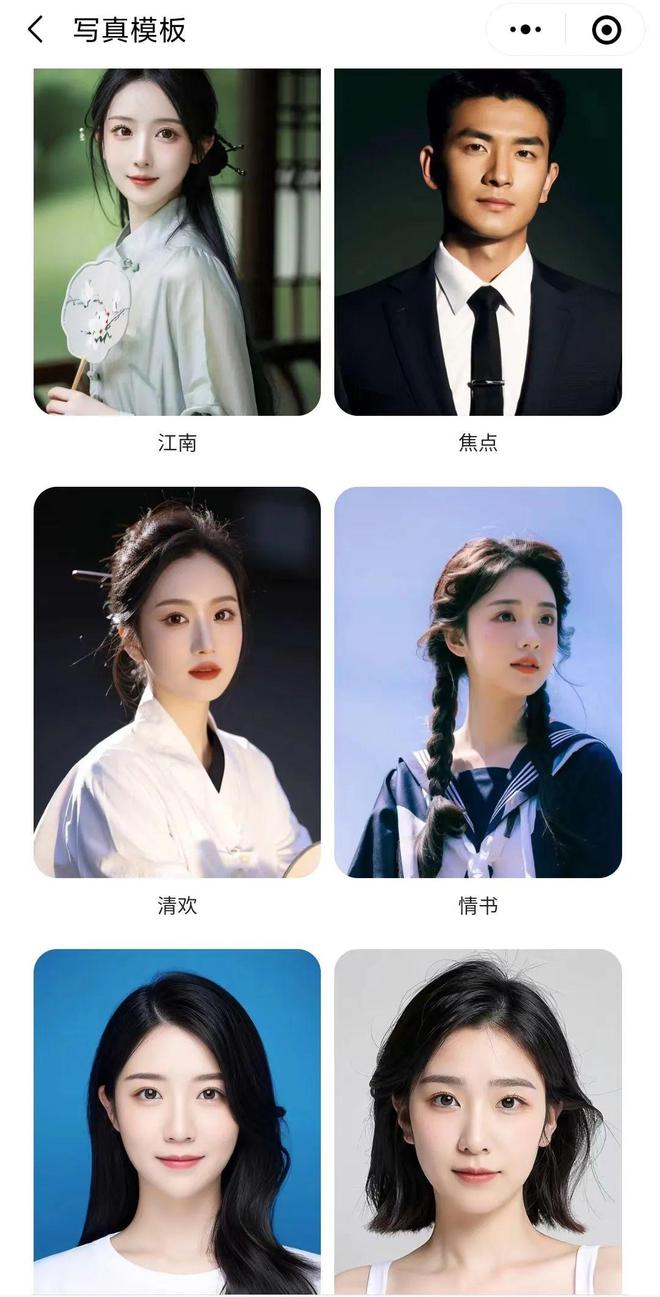[ad_1]
AI-powered photography app “Miao Ya Camera” grew hugely popular in China over the last week as social media has become flooded with people posting AI-generated portrait photo from the app.
For only 9.9 yuan, Miao Ya users can upload 20 images of themselves and the receive dozens of portraits, such as dentification photos, traditional costume photos, Japanese-style campus-themed portraits, gown portraits generated by the app’s artificial intelligence.
The Miao Ya Camera currently offers over 30 different templates, ranging from urban formal wear to luxurious styles. The generated picture quality has reached a remarkably realistic level, making it challenging to distinguish AI-generated photos from real ones.

Many users who have shared their results on social media are amazed by the quality of the generated pictures and have even joked that traditional photo studios like HIMO(” might consider “running away” due to the fierce competition from this AI-generated content.
Due to its ability to create stunningly realistic photos, the app’s popularity skyrocketed after it officially released to the public on July 17th. The waiting time for generating pictures has been consistently increasing, leading to overwhelming demand on the servers, and at times, users have had to wait for more than ten hours to get their pictures processed.
The main appeal of the Miao Ya Camera to users lies not only in its simple “picture generation” process but also in its affordable pricing and good picture quality.
Compared to the high cost of traditional portrait studios, where a basic ID photo can cost around 200 yuan and artistic portraits can go well beyond 500 yuan, Miao Ya Camera offers a fixed price of just 9.9 yuan for all its services.
The AI app operator have close ties to Alibaba Group.
According to Qichacha, a Chinese corporate database, the entity behind Miao Ya Camera is Shanghai-based Weixu Network Technology, which is associated with Youku Tudou, a company that was already acquired by Alibaba Pictures Group Limited (Alibaba Pictures) after the merger of two video streaming platforms-Tudou and Youku. The legal representative of Weixu Network Technology is Zhang Long, who also serves as the Executive Director and General Manager of Youku Video (Xi’an) Media Technology Co., Ltd. On the other hand, Feng Yunle, the supervisor of Weixu Network Technology, holds a position as a supervisor at Alibaba Group.
Founder of Miao Ya Camera, Zhang Yueguang has a background in computer enginnering and product management for Chinese tech companies. After graduating from the undergraduate program in Computer Science and Technology at Tsinghua University in 2012, Zhang Yueguang joined Alibaba, where he was involved in the planning of the “Collect Five Blessings” project for Alipay during the Chinese New Year.
Then, he held various technical positions at different business units of Alibaba, where he was responsible for leading teams handling various businesses such as short videos, live streaming, as well as product and design teams at Youku, a subsidiary of Alibaba.

The latest fad of AI image generator started with Stability AI, the company that created a network model called stable diffusion. The model uses internet data to generate images from text.
On the technical front, AI image generation applications share many similarities, mostly relying on open-source AI painting models. For example, photo editing app Lensa AI relies on a copy of the stable diffusion model. Stable Diffusion uses a massive network of digital art scraped from the internet, from a database called LAION-5B, to train its artificial intelligence.
Similarly, Miao Ya Camera also uses a fine-tuned Diffusion model based on LoRA (a model fine-tuning method). Miaoya’s neural network is continuously learning how to portray faces more accurately.
After the app gained popularity, users quickly discovered that there were issues with Miao Ya Camera’s user agreement. According to this version of the user agreement, any content generated by users using AI on the platform could be perpetually utilized by Miao Ya Camera for various purposes, including commercial use, without any restrictions.
This raised significant privacy and intellectual property concerns as users were worried about the implications of granting such extensive rights to the platform. The controversy surrounding the user agreement brought the company under increased scrutiny and prompted discussions about the importance of transparent and fair data usage policies in AI-based applications.
Faced with the criticisms and doubts surrounding the user agreement, Miao Ya Camera issued an apology statement “We have received feedback from users regarding the Miao Ya user agreement, and we acknowledge that there were inaccuracies in the original content. We took immediate action to rectify the situation based on the actual circumstances of Miao Ya. We solemnly promise here that the photos you upload will only be used for generating digital avatars (or digital clones), and they will not be extracted or used for identification or any other purposes. Furthermore, once the digital avatar creation process is complete, the uploaded photos will be automatically deleted.”
[ad_2]
